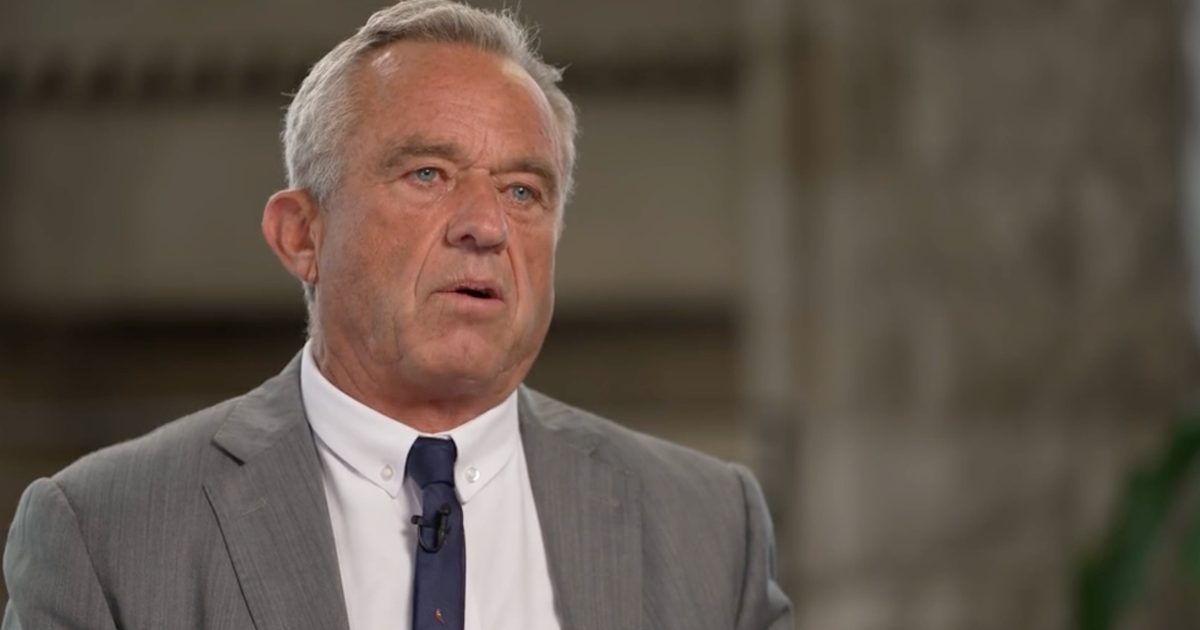Transcript: Kevin Hassett discusses coronavirus and the economy on "Face the Nation," May 10, 2020
The following is a transcript of an interview with White House economic adviser Kevin Hassett that aired Sunday, May 10, 2020, on "Face the Nation."
MARGARET BRENNAN: Elizabeth Palmer, thank you. Kevin Hassett is a White House economic adviser and he joins us this morning. Good morning to you, Kevin.
WHITE HOUSE ECONOMIC ADVISER KEVIN HASSETT: Good morning.
MARGARET BRENNAN: You called this one of the worst jobs reports ever. We know that this has hit Hispanic and African-American population exceptionally hard and that these numbers we're seeing likely don't reflect the real pain out there. Where is the bottom to this?
HASSETT: Well, you know, you are exactly right to emphasize that. The African-American community and the Hispanic American community have been hit especially hard by this jobs report with both of those communities, which were really experiencing record low unemployment rates even in January, seeing massive, massive increases in unemployment. You know, right now, looking across the U.S., there are more than 30 million people that are getting initial claims for unemployment insurance. That's the biggest negative shock to the jobs market that we've seen since World War II. To get unemployment rates like the ones that we're about to see, to get back to your question, which I think will climb up towards 20 percent by next month, you have to really go back to the Great Depression to see that. Now, there are a lot of economic differences between right now and the Great Depression. Here, we understand why the economy is slowing down. And we expect that we can reverse it. Whereas in the Depression, there were a lot of other things, a lot of policy errors and so on, that made the whole thing drag out. So I think if you look at the Congressional Budget Office, they currently forecast that the second half of the year will be one of recovery. You know, God willing, that's what's going to happen. And I think that that's the view that's pretty much shared by the White House. And so I think you could expect to see jobs probably trough, you know, in May or June.
MARGARET BRENNAN: May or June would be the low point for unemployment at what? What rate?
HASSETT: That that that's about what we expect here. You know, I'm looking for rates north of 20, sadly.
MARGARET BRENNAN: North of 20.
HASSETT: In part, part of the- part of this is not really as science as much as just arithmetic.
MARGARET BRENNAN: After the financial crisis, it got- it took a decade to get back to employment levels prior to that. You said on Friday that when it comes to this crisis, there's kind of a silver lining in the jobs report that you saw because you said almost everybody accounted for the increase in unemployment said they expect to go back to work within six months. I'm sure they hope to but isn't that just wishful thinking at this point? You don't know that.
HASSETT: Right. Yeah. Nobody knows it. And, you know, and it's very unsatisfying. Just like none of us really know when the- the virus is going to be either treatable or there'll be a vaccine or, you know, it'll be gone, in which case we could really just go back to our- to our lives. But the fact is that if you think about the things that would happen that would make it hard to turn on the economy, that's like bankruptcies and business failures and so on. We've built a bridge to the other side by having these business- small business loans called the PPP loans, by having a Main Street Lending Facility so that the Fed is making cash available to big businesses, too. And the idea is to try to keep firms up and running, or maybe not running but up, and connected with their workers so that when we turn the switch back on, they can get going right away. Now, again, nobody knows for sure whether it's going to work--
MARGARET BRENNAN: Right.
HASSETT: --exactly that way, but the Congressional Budget Office, that's their median expectation right now.
MARGARET BRENNAN: If you look at the reality for the people who are getting hit the hardest right now, Brookings says one in every five U.S. children are going hungry. What responsibility does the White House have to respond to that? Don't you need to look at doing things like increasing the amount of money available for food stamps?
HASSETT: Right. We- we need to look at everything. You know, we've mailed very large checks to like more than 180 million families to help them with those costs--
MARGARET BRENNAN: Are you going to have to do that again?
HASSETT: --And you're right to emphasize the schools. So- so many children get two meals a day at school. You know, we've got schools within a few miles of my house here in D.C. where we're really without the school meals. A lot of the kids that go to those schools, the principal tells me, would go hungry. And right now, our schools are closed. And those kids who are going to school, by the way, many of them don't have Internet. So they're not connected to society. It's a terrible tragedy. And we're looking at everything we can do to help with that. And so the White House has an opportunity council that's putting together a major proposal that we expect is going to be part of whatever happens in the phase four deal to fill in the gaps that we're noticing as we watch the data. But absolutely, there's a lot that needs to be done, especially for the most disadvantaged.
MARGARET BRENNAN: So you just referenced a phase four deal. Larry Kudlow, one of the White House advisers, said this week that you're putting off any talks about more emergency rescue packages until maybe even June. Why do you think you can wait that long?
HASSETT: Right, well- well, here's what we are doing, OK? We've done this, you know, maybe in cutting the Fed numbers up to about nine trillion worth of actions. And now what we're doing is in the states around the country are starting to turn their economies back on. And so what we're doing is we're watching very closely what happens to those states, get their economies up relatively quickly. Does the opening of the state lead to a new outbreak of the disease? We've built a bridge that pretty much, you know, lasts--
MARGARET BRENNAN: Right.
HASSETT: --for- for quite a bit of time right now with that nine trillion dollars. And then the question really becomes, is phase four really going to be extending the bridge because we're not there yet? Or is it going to be focused on growth and making sure that now that we're on the other side, that we have a healthy economy again? And so right now, what we're doing is basically building a plan for either scenario and we're gonna be ready to act as soon as we need to. But- but I think that right now we have bought some time with all the money that we've thrown at the economy and we've been using the time to do things like develop treatments, improve our treatments, learn more about social distancing and so on.
MARGARET BRENNAN: But companies and employers need to know what to do to safely re-open. The White House is testing staff regularly. Is that what you're advising America's businesses to do? When will the CDC release specific guidance?
HASSETT: You know, I- I'm not a doctor. I'm just an economist, and I- I could tell you--
MARGARET BRENNAN: Well, neither are these CEOs.
HASSETT: --that as- as we learned this--
MARGARET BRENNAN: That's why they're asking for the CDC to provide guidance.
HASSETT: Yeah. No, that's right. That's- but I'm going to say that, of course, we need to ramp up testing. That's something that the president has heavily emphasized. And just last week, we had one day where there were 300,000 tests and then there is a new test approved that will hopefully increase that by an order of magnitude. But you're absolutely right that testing is a key component of it, but even testing doesn't remove all risk. And so the interesting, sad thing about my- my dear colleague who was stricken with the coronavirus this week is that we were getting tested because we're close to the president every day. And even with that, you know, she tested negative one day and then positive the next day. And she's going to work at a community where people are being tested. And so this is a very, very scary virus. You know, that- that people are going to go back to work and they're gonna be worried about things. And it's going to take awhile for things to get back to normal absolutely.
MARGARET BRENNAN: Yeah, so--
HASSETT: But what we can do is we maximize the chance that that happens quickly by making lots of testing available. And that's why we focused so much energy on that.
MARGARET BRENNAN: I didn't hear a date on when that CDC guidance is going to be released. But when it comes to your work environment you just described,--
HASSETT: Yeah.
MARGARET BRENNAN:-- do you wear a mask? Are you going to continue to show up for work at the White House?
HASSETT: You know, I- I've got a mask right here. And the fact is that- that I practice aggressive social distancing. I'll wear a mask when I feel it's necessary. It is scary to go to work. You know, I- I was not part of the White House in March. I think that I'd be a lot safer if I was sitting at home than I would be going to the West Wing. But, you know, it's the time when people have to step up and serve their country. And if I think about the amazing accomplishments of the team that we put together that's been down in the basement of the White House getting data from all over the government to help us decide how to solve the ventilator problem and the PPE problem and everything. But I think everybody knows that they go into work. You've been in the West Wing. You know, it's a- it's a small, crowded place. It's, you know, it's a little bit risky. But- but you have to do it because you have to serve your country. And there are a lot of things that you can't do except there. Like if you're going to have secure communications, you need to be in the Situation Room.
MARGARET BRENNAN: Kevin Hassett, thank you for your time. We'll be back in one minute with some new coronavirus projections.



